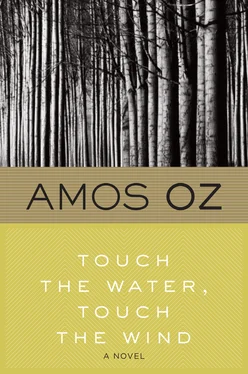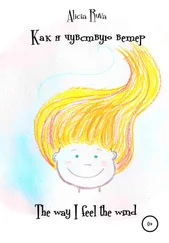Amos Oz - Touch the Water, Touch the Wind
Здесь есть возможность читать онлайн «Amos Oz - Touch the Water, Touch the Wind» весь текст электронной книги совершенно бесплатно (целиком полную версию без сокращений). В некоторых случаях можно слушать аудио, скачать через торрент в формате fb2 и присутствует краткое содержание. Год выпуска: 1991, Издательство: Mariner Books, Жанр: Современная проза, на английском языке. Описание произведения, (предисловие) а так же отзывы посетителей доступны на портале библиотеки ЛибКат.
- Название:Touch the Water, Touch the Wind
- Автор:
- Издательство:Mariner Books
- Жанр:
- Год:1991
- ISBN:нет данных
- Рейтинг книги:5 / 5. Голосов: 1
-
Избранное:Добавить в избранное
- Отзывы:
-
Ваша оценка:
- 100
- 1
- 2
- 3
- 4
- 5
Touch the Water, Touch the Wind: краткое содержание, описание и аннотация
Предлагаем к чтению аннотацию, описание, краткое содержание или предисловие (зависит от того, что написал сам автор книги «Touch the Water, Touch the Wind»). Если вы не нашли необходимую информацию о книге — напишите в комментариях, мы постараемся отыскать её.
1939. As the Nazis advance into Poland, a Jewish mathematician and watchmaker named Pomeranz escapes into the wintry forest, leaving behind his beautiful, intelligent wife, Stefa. After the war, having evaded the concentration camps, they begin to build new lives, Stefa in Stalin’s Russia and Pomeranz in Israel, where, as they move toward reunion, another war is brewing. An intricate tale of people seeking escape from a hostile world in thrillingly fantastical ways.
Touch the Water, Touch the Wind — читать онлайн бесплатно полную книгу (весь текст) целиком
Ниже представлен текст книги, разбитый по страницам. Система сохранения места последней прочитанной страницы, позволяет с удобством читать онлайн бесплатно книгу «Touch the Water, Touch the Wind», без необходимости каждый раз заново искать на чём Вы остановились. Поставьте закладку, и сможете в любой момент перейти на страницу, на которой закончили чтение.
Интервал:
Закладка:
The earth felt like velvet to him, and repentantly he breathed it, a warm, smoldering sound, a low hhhhhhh like the swish of the pines.
There was peace all around.
And in him.
26
Spring had come. The snow began to thaw, the birds returned from their wanderings, and in the suburbs of Moscow there were rowboats on the lakes once more. And Mikhail Andreitch, too, or whatever his name might be, returned from Palestine, laden with photographs and tape recordings and numerous stories, all of which he laid before the Chairman of the Sixth Bureau. As usual, he embellished his stories with skill and elegance, cheerfully exaggerating and lingering on trivial details to the point of exasperation. He spoke for three days and nights without stopping, except when ordered to serve tea; even when she dozed Stefa heard his voice, she strayed into dreams and still he did not stop talking. He told with amazement of the beauty of the landscape, the energy of the Jews, the pitiful dimensions of the River Jordan, the building of the country by miscellaneous immigrants on principles beset with contradictions. He spoke too of the military, the economic, the scientific potential, and about the nature of the human material: mad Yiddish watch-menders who invented theorems and provided proofs, pallid Polish peddlers, and up in the hills of Galilee a simple shepherd of remarkable powers, who was either a charlatan or a genius. The photographs showed, the recordings were clear, perhaps somewhere far away in the hills the ultimate solution had been found. It may be, Comrade Fedoseyeva, it may be that we have certain possibilities open to us, startling possibilities, if it is not just a snare and a delusion. There may be hidden powers, revolutionary sources of energy. How can I, bumpkin that I am, comprehend such subtleties. This may lead to secret rays, absolute weapons. Surely we must be struck by total fear and panic, Comrade Fedoseyeva, at the unfolding of the mysteries of the universe. And from now on anything is possible, absolutely anything, I can't tell you, forgive me, I can't tell you how frightening it is. Just touch us with your fingertip, you will see that for some time we have been shaking, shaking with fear like a little child. Yes. I'll stop at once. Right away, Comrade Fedoseyeva, at once, immediately, you see, three four hush. Andreitch is quiet as can be. Distinctly silent.
At Easter, when she had a holiday, Stefa went to Novosibirsk for a few days as the guest of the Deputy Commissar for electrical engineering. This man, who was a great expert on the poetry of Pushkin and court scandals in pre-Revolutionary Petersburg, had been pursuing Fedoseyeva for some time and had even sent her an epic poem he had written. He was swarthy and heavy-featured, was missing his left arm, and had a colorful collection of military decorations. His name was Kumin, Engineer Kumin, and there were many who disliked his sharp mind and grim sobriety.
Kumin welcomed Stefa in a bearskin coat, and conveyed her by snow car to the temporary office which he had set up in a small hotel. After ceremoniously helping her off with her coat he helped her to two or three glasses of vodka and then immediately offered her a choice of program: a meal, a rest, a conversation, or an outing, or any combination of some or all of these possibilities, in any order she chose. Stefa, coldly and politely, beguiled Kumin with one of her most direct smiles, till his chin shook and his flow of words stuttered to a halt. She would like to go out, provided that he himself would be her guide, and choose and explain what he considered to be the most interesting sights.
Did the Deputy Commissar really hope to deceive Stefa, to conceal his wild fantasies, as if he were not trembling all over like a powerful engine.
They went by snow car to inspect the project between the mountains and the lake. The dazzling whiteness of the snow forced them to put on dark glasses. Kumin laughed and exclaimed all the time, more like an enthusiastic schoolboy than a Deputy Commissar. And Stefa with her white hand offered him an occasional tiny glimmer.
They drew up alongside a row of monstrous transformers, and Kumin delivered a few casual explanations. His distraction was so evident that the men who accompanied them secretly sniggered. The sharp-sighted Commissar noticed and dismissed them with a wave. In the underground engine rooms they were escorted only by his most personal secretary and a senior technician. But not even these two were permitted to follow them into the office. At the door Kumin bowed, bumped his head on the doorpost, sprang back, half pushed his guest into the room and locked the door behind them. He stood facing her, looking woebegone and lost.
Suddenly he seized a stick and without a word began pointing to the plans and diagrams which lined two of the walls. Now, thought Stefa, he's going to turn the lights down and kneel in front of me, or lash out suddenly with the stick and hoist my dress over my face.
But Kumin neither knelt nor attacked her. Instead, he collapsed into the armchair, covered his face with his one hand, and began to stammer that they were not really strangers, they were not just chance acquaintances thrown together by circumstances, no, they were brother and sister, and no power in the world could sever such a blood tie.
"I… I've no idea what you're talking about, Osip Grigorich."
"You are my sister, Comrade Fedoseyeva, why do you mock me, why this game of hide-and-seek, you are my sister and I am your brother, and that's that."
"Then I must be either drunk or mad, because I can't understand a word you're saying."
" Lehayim. Yom Kippur. Mazzeltov. Yisroel. We're brother and sister, Comrade Fedoseyeva. Not two but one. Yomtov, Boruch-Ato. We two are one being, whose heart longs for its own land. You must surely have heard, in your work, how things are there, in our land, why are you silent, why don't we fall into each other's arms and weep hot tears together? There is no snow there, no wolves or bears, but there our Jews sow in sunshine, run, kiss, breathe in sunshine on our mountains and there they write poems or keep cats or plant avenues of trees there on our mountains, a Jewish mountain, Comrade Fedoseyeva, and it doesn't collapse, it stands solid and high, just a Jewish mountain, as if it was the simplest thing in the world to be a Jewish mountain or a Jewish sea or forest, or even just a plain Jewish log for all the world like any other damned log, a Bulgarian log, a Turkish log, only it's a Jewish log in a Jewish country. Can our tiny mind grasp it, Comrade Fedoseyeva? And what does it all amount to, apparently to a deep and terrible desire to live and to touch everything, even to trip over it, to stumble and fall, it means a peace treaty between Jews and the tangible sphere, and for a given number of tangible objects within a limited territory a peace with Jews. With Jews, Fedoseyeva my dear, with Jews like you and me, come, cling to me, my sister, it means the conversion to Judaism of a strip of land, its water, its woods, its fields and plains, as if at long last some god has taken pity on us, and in a flash everything is changed, from now on the galaxy is prepared to tolerate us, to put up with our appearance, to endure our tunes, our smells, our jokes, no longer to harass us continually, even if it is only in one tiny corner, at the ends of the earth, in Lilliput. Suddenly we have all been granted a pardon beyond all hope, we have Anally been forgiven, and there are beautiful Jews there who are some times permitted to forget and only remember when they have a mind to. And to dwell in sunshine and be called by their own names all the days of their lives, plant and walk and shoot and spit as they wish, there you're crying with me, my sweetheart, you can't stop yourself, don't try to hide it, we'll cry together for two minutes and then we'll dry our eyes and go and look at the turbines and after the turbines we'll go straight back to the hotel to my room to my bed and if you refuse so help me I'll blot you off the face of the earth, my lovely sister. Now here we have three pumps, the biggest pumps in Russia, between the three of them they can drain the whole Baltic Sea down to the last drop in a hundred and ten days. I mean in theory, of course. Just imagine, my dearest. Everything I was saying was only for the purpose of illustration, and for the same purpose I'll tell you a little story. My father was a kind of Hebrew poet, a kind of madman, a Zionist, a stray lamb in the streets of Odessa. All his life he wrote poems about Mount Carmel and Mount Tabor and Mount Moriah, about the wailing wall in Jerusalem, about the desert and the holy tombs. So great was his yearning that he (ell suddenly ill. It was a kind of gut rot. It was pretty foul. The poor devil suffered torture, and all his family suffered torture too with the symptoms. My father was in agony for seven years. And I, being an absolute bloody bastard, I couldn't stand the sight of his suffering and a few years ago I packed him off to Palestine before it was the death of him or he was the death of me. And do you know, Fedoseyeva my darling, what became of him there in the land of his dreams in the twilight of his life? The old man settled down, no doubt on one of the hills to which he had always lifted up his eyes, among his holy tombs, and there, in his long-dreamed-of Palestine, among the hills and tombs, there the old man goes on to his dying day writing heart-rending poems of longing for some other Palestine, the real one. All with perfect faith. All in Hebrew. And in Biblical language."
Читать дальшеИнтервал:
Закладка:
Похожие книги на «Touch the Water, Touch the Wind»
Представляем Вашему вниманию похожие книги на «Touch the Water, Touch the Wind» списком для выбора. Мы отобрали схожую по названию и смыслу литературу в надежде предоставить читателям больше вариантов отыскать новые, интересные, ещё непрочитанные произведения.
Обсуждение, отзывы о книге «Touch the Water, Touch the Wind» и просто собственные мнения читателей. Оставьте ваши комментарии, напишите, что Вы думаете о произведении, его смысле или главных героях. Укажите что конкретно понравилось, а что нет, и почему Вы так считаете.

![Хироми Каваками - Strange Weather in Tokyo [= The Briefcase]](/books/29150/hiromi-kavakami-strange-weather-in-tokyo-the-br-thumb.webp)










